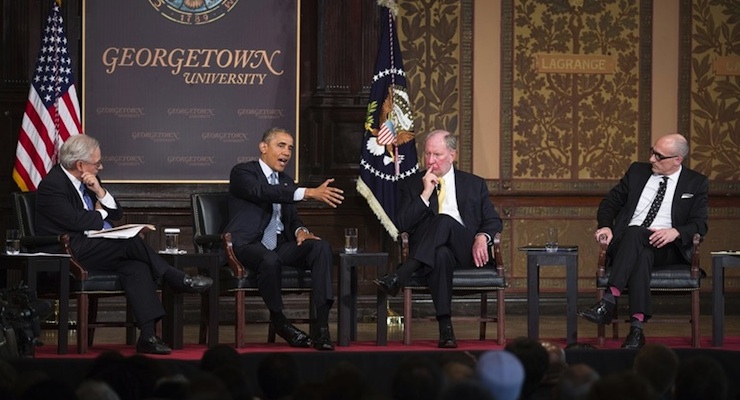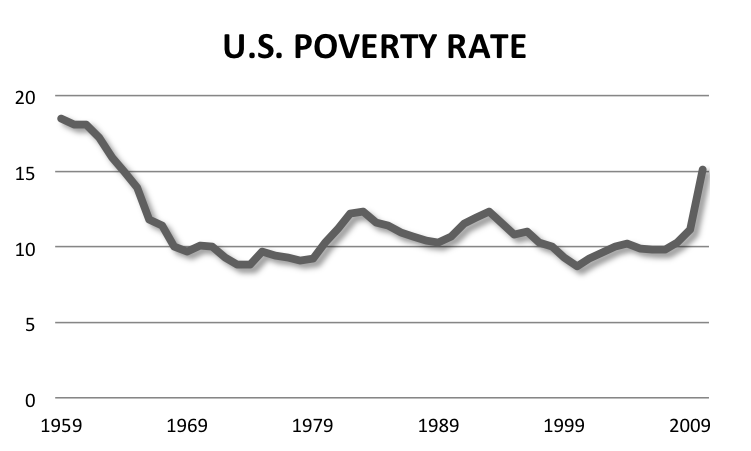

From left, E.J. Dionne, Robert Putnam and Arthur Brooks listen to President Barack Obama speak Tuesday during the Catholic-Evangelical Leadership Summit on Overcoming Poverty at Georgetown University in Washington. (Photo: CNS/Tyler Orsburn)
President Obama recently took part in a poverty panel at Georgetown University. By D.C. standards, it was ideologically balanced since there were three statists against one conservative (I’ve dealt with that kind of “balance” when dealing with the media, as you can see here and here).
You won’t be surprised to learn that the President basically regurgitated the standard inside-the-beltway argument that caring for the poor means you have to support bigger government and more redistribution.
Many observers were unimpressed. Here’s some of what Bill McGurn wrote for the Wall Street Journal.
The unifying progressive contention here is the assertion that America isn’t “investing” enough in the poor—by which is meant the government isn’t spending enough. …President Obama…went on to declare it will be next to impossible to find “common ground” on poverty until his critics accept his spending argument.
I think this argument is nonsense. We’re spending record amounts of money on means-tested, anti-poverty programs, yet the poverty rate hasn’t come down since the “War on Poverty” started.
Indeed, you can make a very persuasive case that government intervention has backfired since the poverty rate was falling before the federal government got involved. Yet now that Washington is paying people to be poor, progress has ground to a halt.

In his column, though, McGurn pointed out that it’s also important to look at how money is spent.
…it’s simply false to say that Republicans won’t make the public “investments” needed to help the poor. In New York in the 1990s, for example, Republican Mayor Rudy Giuliani not only invested in the police but sent them into the areas where they were most needed—primarily poor and minority neighborhoods. In too many other Democratic cities, by contrast, mayors in effect cede whole neighborhoods to the thugs and gangs. Republicans are also willing to spend on education. What they are not willing to do is dump ever more dollars down the same rathole of big-city public school systems that function more as jobs programs for city bureaucrats and members of the teachers unions.
And he challenged the view of some GOPers that government spending will promote stable families.
…it would similarly be good for Republicans to address the hard implications of their own message. If, for example, broken families are indeed driving modern American poverty, is the only answer despair—or praying for some miracle? And if you believe the government can’t help but bungle something as basic as food stamps, shouldn’t you bring this same skepticism to a “conservative” program that enlists the government to, say, discourage divorce or promote chastity?
I certainly agree with that point. President Bush’s program to encourage marriage certainly wasn’t a success.
But let’s focus on the present. Here’s some of what Thomas Sowell said about Obama’s performance. As you can see, he was not impressed with the President’s abuse of the English language.
One of the ways of fighting poverty, [the President] proposed, was to “ask from society’s lottery winners” that they make a “modest investment” in government programs to help the poor. …But the federal government does not just “ask” for money. It takes the money it wants in taxes, usually before the people who have earned it see their paychecks. …It seizes what it wants by force. If you don’t pay up, it can take not only your paycheck, it can seize your bank account, put a lien on your home and/or put you in federal prison. So please don’t insult our intelligence by talking piously about “asking.”
And Sowell closes his column by raising the fundamental question of whether it makes sense to let government consume a greater share of economic output.
The fact that most of the rhetorical ploys used by Barack Obama and other redistributionists will not stand up under scrutiny means very little politically. After all, how many people who come out of our schools and colleges today are capable of critical scrutiny? When all else fails, redistributionists can say, as Obama did at Georgetown University, that “coldhearted, free-market capitalist types” are people who “pretty much have more than you’ll ever be able to use and your family will ever be able to use,” so they should let the government take that extra money to help the poor. …The real question is whether the investment of wealth is likely to be done better by those who created that wealth in the first place or by politicians. The track record of politicians hardly suggests that turning ever more of a nation’s wealth over to them is likely to turn out well.
Amen. The academic evidence is very strong that nations with large public sectors suffer from economic anemia.
And since the poor are most dependent on growth to get a good foothold on the economic ladder, Prof. Sowell surely is right when he states that it’s better to leave resources in the productive sector of the economy. Moreover, he’s explained in the past that the welfare state certainly doesn’t help the poor.
P.S. Since today’s column ended with a discussion about whether government should be bigger or smaller, it’s appropriate to share this bit of humor concocted by the Princess of the Levant.
If you’re a new reader and don’t get the joke, Richard is famous for the Rahn Curve, though I think he overstates the growth-maximizing size of government. As such, I argue that we need to impose my (not nearly as famous) Golden Rule of spending restraint.
P.P.S. Shifting back to the topic of poverty and redistribution, we should all be very concerned that the Obama White is trying to manipulate the definition of poverty in order to justify ever-larger amounts of redistribution and dependency. And you won’t be surprised to learn that the OECD supports this dishonest and misleading initiative.
P.P.P.S. Here’s an image that accurately summarizes the left’s misguided view of redistribution.
[mybooktable book=”global-tax-revolution-the-rise-of-tax-competition-and-the-battle-to-defend-it” display=”summary” buybutton_shadowbox=”true”]







